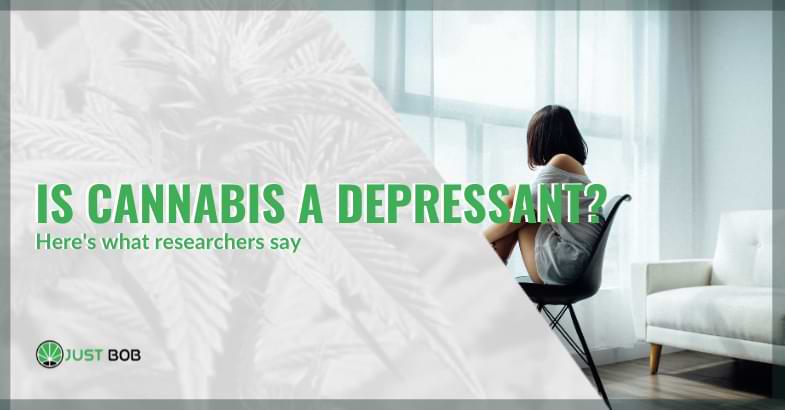Published on: 28/12/2023
The role of CBD in the treatment of depression
Did you know that depression is one of the leading causes of disability in the world? Millions of individuals across the globe face this daily challenge, fighting an inner battle against devastating emotions and a persistent lack of interest in life. But what really is depression? And what factors can contribute to the onset of this complex mental condition?
In this article, we will explore depression in its most profound aspects, discovering how a combination of genetic components, neurological alterations and psychosocial factors can influence its development.
However, our focus will not only be on understanding this condition; we will also discuss the interesting connection between CBD oil and our body’s endocannabinoid system. Could CBD offer natural hope in the management of depressive symptoms?
Let’s find out together on this journey through science and research.


Anxiety and depression: what is depression?
Depression is a mental condition characterised by a disturbed, empty, unstable, sad mood, loss of interest and persistent lack of motivation.
The typical symptoms of depression are still underestimated: depression can be considered pathological when its presence interferes with an individual’s normal activities. It is worth remembering that when you think you are suffering from depression, it is essential to consult your doctor so that you can receive the necessary support.
The cause of depression is unknown but probably includes:
- A hereditary component
- Changes in neurotransmitter levels
- Alterations in neuroendocrine function and psychosocial factors
CBD oil has been shown to interact with the endocannabinoid system, which is a system in the body that regulates inflammation, pain, mood, sleep and appetite.
Endocannabinoids bind to cannabinoid receptors throughout the brain, and CBD can increase the share of endocannabinoids in the brain.
This, in turn, can help regulate mood and reduce symptoms of depression, such as anxiety and irritability.
Read also: Cannabis in the Bible: what does religion say about marijuana?
How CBD works: the endocannabinoid system
The endocannabinoid system, like the nervous system, the immune system and the endocrine system, with which it chooses to play modulator, constitutes one of the existing biological systems within the human body.
It refers to an individual’s collection of endocannabinoids and regulates a number of bodily and cognitive processes, including hunger, pain sensation, pleasure and sleep.
The endocannabinoid system can be visualised as an operating system consisting of three components:
1. Сannabinoids, which may be intrinsic (endocannabinoids) or external (phytocannabinoids), occur naturally in a variety of plants, particularly Cannabis.
They are the molecules that send messages and data to other cells in the body, acting as ‘signalling molecules’ in the body.
There are two types:
- Endocannabinoids, which originate within our bodies, include 2-arachidonoylglycerol (2-AG) and anandamide. The small signal molecules that activate the receptors are derived from arachidonic acid, a polyunsaturated fatty acid.
- Those coming from outside (phytocannabinoids) and observed inside marijuana plants or light cannabis, on the other hand, are the following. Delta-9-tetrahydrocannabinol (THC) and cannabidiol are two of the best known cannabinoids (CBD).
2. Cannabinoid receptors: they become necessary for this transmission.
Cannabinoid receptors form a network of receptors and are classified into two types, which are found in different compartments and membranes throughout our body:
- CB1 receptors
- CB2 receptors
Put simply, CB1 receptors are located in the nervous system and brain, while CB2 receptors in the immune system.
3. Enzymes: these are proteins that enable interactions between cannabinoids and endocannabinoid receptors on a technical level.
CBD, which we recall has no psychotropic effects, acts indirectly on the receptors of the endocannabinoid system.
It does not treat any specific pathology, but rather functions as a ‘regulatory’ substance of our endocannabinoid system.
Indeed, CBD has the ability to regulate processes that simply exist in our bodies.
How come?
Basically, when the endocannabinoid system is out of balance, the signalling provided by cannabinoids, e.g. on innate immunity or implicitly on systemic inflammation, seems to restore the original balance.
Cannabidiol acts by indirectly modulating a variation in the human endocannabinoid system triggered by disease or trauma.


Cannabis as an answer to treating depression
Studies on cannabis to treat depression are still in their infancy. However, it appears that CBD acts on the endocannabinoid system and, in particular, on mood functions.
Through the same mechanism seen with regard to anxiety, CBD also acts on mood to rebalance those cycles that have experienced imbalance within the body.
Cannabinoid receptors are called endocannabinoids, i.e. lipid mediators that make up the endocannabinoid system. Endocannabinoids regulate so many human processes such as human cognition, emotions and motor activity and have a chemical composition similar to that of cannabis. This is why they are activated by CBD and THC contained within the plant.
The interaction of cannabinoids on the system was tested by scientists at the University at Buffalo Research Institute od Addictions (RIA), who studied both depression and chronic stress. It emerged that the chemicals produced by the brain are similar to those contained in the cannabis plant. From the results, the scientists deduced that the components of cannabis may be helpful in resolving the aforementioned disorders.
Research was initially conducted on animals. Scientists noted that chronic stress reduced the brain’s production of endocannabinoids, the consequence of which was a state of depression. The use of compounds derived from cannabis was able to bridge this gap by reducing depression and restoring the subject’s state of mind.
As you can see, CBD is capable of solving even a serious problem at its root, instead of merely numbing the symptoms.
But… Are there any risks?
Many people wonder whether cannabis against depression is responsible for any side effects, including the exacerbation of the depressive state itself. In fact, to date there is not enough evidence that serious side effects exist.
A survey, one of the few conducted in the United States, on the benefits of cannabis was conducted. The results were encouraging, as 71% reported only benefits and no contraindications, while 6% reported throat irritation and 5% were simply worried about being arrested, despite medical cannabis being legal in the state of Hawaii where the survey was conducted.
It appears, however, that if a subject is particularly prone to states of psychosis, these may be more easily induced by cannabis, which may exacerbate delusions.
So, here’s the bottom line.
The most pressing question at this point is: is CBD oil good for depression?
Research shows that the effect of CBD as an active ingredient on depression and anxiety symptoms can improve the quality of life of people suffering from depression.
People who suffer from anxiety and depression, anxiety disorders, sexual dysfunction, social anxiety disorder, depressive disorders and post-traumatic stress disorder have difficulty regulating the neurotransmitter serotonin.
Research suggests that serotonin is responsible for mood balance and that low serotonin levels denote a depressive profile.
Read also: Cloning a cannabis plant: how does it work?
Conclusions
In conclusion, depression is a complex mental condition characterized by persistent feelings of sadness, loss of interest, and a lack of motivation. While the exact cause of depression remains unclear, it is believed to involve genetic factors, changes in neurotransmitter levels, and psychosocial influences.
CBD oil has garnered attention for its potential to interact with the endocannabinoid system, which regulates various bodily and cognitive processes, including mood. By increasing the presence of endocannabinoids in the brain, CBD may help regulate mood and alleviate symptoms of depression, such as anxiety and irritability.
The endocannabinoid system operates as a crucial network of cannabinoids, cannabinoid receptors, and enzymes, and CBD acts as a regulatory substance for this system. Although research on cannabis as a treatment for depression is still in its early stages, studies have shown promising results in animal models and indicate that CBD may help restore balance to the endocannabinoid system and alleviate depression.
While there is limited evidence of serious side effects from CBD use, caution should be exercised, especially for individuals prone to psychosis, as cannabis use may potentially exacerbate delusional states.
Overall, the research suggests that CBD oil has the potential to improve the quality of life for those suffering from depression and anxiety-related disorders by positively influencing the serotonin levels responsible for mood regulation. However, it is crucial for individuals experiencing symptoms of depression to seek professional medical advice and support to determine the most appropriate treatment for their specific condition.
💡Takeaways on depression and CBD
- Depression is a mental condition characterised by a disturbed, empty, unstable and sad mood, with loss of interest and persistent lack of motivation.
- The typical symptoms of depression are often underestimated: it becomes pathological when it interferes with an individual’s normal activities. If depression is suspected, it is essential to consult a doctor for the necessary support.
- The cause of depression is still unknown, but could include a hereditary component, changes in neurotransmitter levels and psychosocial factors.
- CBD (cannabidiol) interacts with the endocannabinoid system in the human body, which regulates inflammation, pain, mood, sleep and appetite.
- The endocannabinoid system is composed of endocannabinoids (produced by the body) and external cannabinoids (phytocannabinoids) found in some plants, especially Cannabis.
- CBD acts indirectly on the receptors of the endocannabinoid system, helping to restore the body’s balance when this system is subjected to an imbalance caused by disease or trauma.
- Studies on the use of cannabis to treat depression are still in their infancy, but it appears that CBD acts on the endocannabinoid system, particularly on mood-related functions.
- CBD is able to act on the roots of the problem rather than simply alleviating the symptoms, as shown by studies on animals and patients suffering from depression and chronic stress.
- There is insufficient evidence of serious side effects related to the use of CBD to treat depression. Most people report benefits without significant contraindications.
- However, in individuals particularly prone to states of psychosis, CBD may exacerbate delusions and therefore should be used with caution in such cases.
- Research suggests that CBD may improve the quality of life of people suffering from depression, as it may act on symptoms of anxiety and depression by regulating serotonin, a neurotransmitter related to mood balance.
- In conclusion, CBD could be a promising treatment option for people suffering from depression, but it is always advisable to consult a doctor before embarking on any kind of treatment.
FAQ on depression and CBD
What is depression?
Depression is a mental condition characterised by a disturbed, empty, unstable and sad mood, loss of interest and persistent lack of motivation. Depression can be considered pathological when it interferes with an individual’s normal activities. It is essential to consult a doctor when one suspects suffering from depression in order to receive the necessary support.
What are the causes of depression?
The causes of depression are unknown, but probably include a hereditary component, changes in neurotransmitter levels, alterations in neuroendocrine function and psychosocial factors.
How does CBD work for depression?
CBD oil has been shown to interact with the endocannabinoid system, which regulates inflammation, pain, mood, sleep and appetite. Endocannabinoids bind to cannabinoid receptors in the brain, and CBD can increase the share of endocannabinoids in the brain. This can help regulate mood and reduce symptoms of depression, such as anxiety and irritability.









